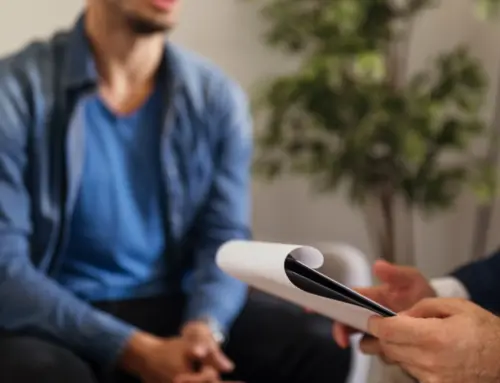The conversation around mental health medications is often clouded by misconceptions, particularly when it comes to addiction. Zoloft, a widely prescribed antidepressant, can many times be at the center of this debate.
With an estimation of over 8 million people in the US taking it (based on a 2022 study), understanding its safety profile (as well as the signs of abuse) is crucial.
Many patients grapple with the fear of dependency before starting treatment, wondering “Is Zoloft addictive?”
Let’s break through the myths and explore what science genuinely reveals about Zoloft and its nebulous relationship with addiction.
Our Texas recovery center offers inpatient and outpatient programs for individuals struggling with addiction. Contact us today to take your next steps towards healing.
Understanding Zoloft and SSRIs

Zoloft, or sertraline, is a member of the Selective Serotonin Reuptake Inhibitors (SSRIs) class of medications.
This category is primarily designed to boost levels of serotonin — one of the brain’s key neurotransmitters responsible for regulating mood, anxiety, and emotional well-being.
How addictive is Zoloft compared to other medications?
Well, unlike addictive substances that deliver quick, euphoric highs, SSRIs such as Zoloft work methodically over weeks, gradually recalibrating brain chemistry to foster improved emotional stability.
Let’s also consider how it functions. Zoloft blocks the reabsorption of serotonin in the brain, which means more of this crucial neurotransmitter remains available for communication between nerve cells. This mechanism of action is therapeutic, though it may take time to feel the full benefit.
https://youtu.be/J7CzSrFHqDk?si=3R_JXw79SvC9yozM
Is Zoloft Addictive?: Difference Between Dependence and Addiction

To address the core question — “Is Zoloft addictive?” — it’s crucial to distinguish between dependence and addiction. These terms are often misunderstood and, alarmingly, frequently used interchangeably.
The medical community often discusses whether Zoloft is considered addictive, emphasizing its therapeutic benefits.
Dependence is a physiological state where the body adapts to the presence of a drug. It’s common with many medications and can lead to withdrawal symptoms if use is abruptly stopped. Think of it like this: your body can become reliant on thyroid medication without becoming addicted.
Now, let’s differentiate addiction. Characterized by compulsive behavior, cravings, and a desire to keep using substances despite negative consequences, addiction goes far beyond mere physical reliance.
While Zoloft can lead to physical dependence, it does not provoke the addiction-related behaviors seen with opioids or stimulants. It’s essential to differentiate between the question of whether Zoloft is addictive and the reality of its use in mental health treatment.
Our rehab in Midland has cultivated full recovery for individuals struggling with drug and alcohol addiction — we’re here to help so you can thrive.
Common Misconceptions

“Zoloft Isn’t Addictive”
Many people, specifically those who struggle to manage their own drugs, might believe that Zoloft is completely safe and non-addictive, equating it with vitamins or over-the-counter supplements.
Is Zoloft considered addictive? The fast answer — it should always be.
Zoloft can lead to dependence in some individuals, particularly if not managed properly.
Patients may find themselves relying on it to cope with daily challenges, which can create a false sense of security. Understanding the potential for dependence is crucial; it’s not just a simple medication you can stop at will.
“You Can Stop Taking Zoloft Any Time”
Understanding if is Zoloft an addictive drug is essential for patients who are concerned about long-term use —
It’s a common belief that Zoloft can be discontinued at will without consequences. However, stopping suddenly can lead to withdrawal symptoms or a relapse of the original condition. Gradual tapering under medical supervision is often necessary — which is why in our treatment programs, we’ll create a medical detoxification program for those who are struggling to manage their medication.
“Zoloft Isn’t That Addictive”
While many believe that Zoloft is entirely non-addictive, this statement may oversimplify the reality of its use.
Zoloft, as a Selective Serotonin Reuptake Inhibitor (SSRI), operates differently from substances like opioids or benzodiazepines, which create immediate euphoric effects. However, some individuals may develop a psychological dependence on Zoloft as they become accustomed to its stabilizing effects.
This can lead to a belief that they cannot function without it, particularly during challenging times. It is essential to recognize that while Zoloft does not produce a traditional addiction, the potential for dependency exists if not managed properly.
Understanding this nuance and SSRI dependence, in general, should help you maintain a healthier perspective on their treatment and emphasize the importance of using the medication under the guidance of a healthcare professional, who can help them navigate the process safely and effectively.
Physical Dependence Signs

Being aware of physical dependence does not detract from the necessity of prescribed medications. In fact, understanding these signs can lead to better compliance and management of treatment.
Tolerance Development
As your body adjusts to medications like Zoloft, you may notice changes in its effectiveness. This may or may not be distinct from addiction-related tolerance.
Healthcare providers often describe this tolerance development as part of the therapeutic journey — the process of finding the right dose to achieve the desired effects. If dosage adjustments are necessary, they should always be discussed with a healthcare provider to ensure the best therapeutic outcomes.
However, if you or your loved one notice a growing obsession with wanting more and more even beyond a doctor’s recommendation, it may be time to consider seeking help.
Dizziness
Dizziness can be a common side effect during the treatment or discontinuation of Zoloft. This symptom, while potentially uncomfortable, is typically temporary.
Patients are encouraged to talk openly with their healthcare providers about any dizziness they experience. Strategies may include careful movements or staying hydrated to minimize discomfort.
Communication is pivotal here; reporting persistent dizziness can lead to tailored approaches to manage this side effect effectively.
Electric Shock Sensations (Brain Zaps)
These brief, electric shock-like sensations can occur during the tapering process and may invite anxiety among patients transitioning off Zoloft.
While they can be jarring, it’s crucial to acknowledge that these sensations are generally harmless and transient.
Withdrawal Symptoms
Patients may experience antidepressant withdrawal if they stop taking Zoloft abruptly or are using it in a way that’s causing self-harm.
Common withdrawal symptoms of someone who may be abusing Zoloft (or another drug similar to it) may antidepressant withdrawal symptoms including:
- Flu-like symptoms
- Nausea and vomiting
- Dizziness or lightheadedness
- Irritability or agitation
- Mood changes
- Shock-like sensations
- Headaches
- Cognitive difficulties
Seek Help with the Springboard Center
If you or a loved one is struggling to manage a Zoloft prescription or other antidepressant, our medical detox program has helped ensure safe withdrawal management tailored to the individual’s need.
Experience the healing power of a structured residential program or a tailored outpatient program, designed to support your recovery journey. And, if you’re a family member looking to help how you can, explore our family program to strengthen your support network and meet others who are going through the same struggles as you are.
There is hope, healing, and recovery at the Springboard Center — contact us today to get started.



